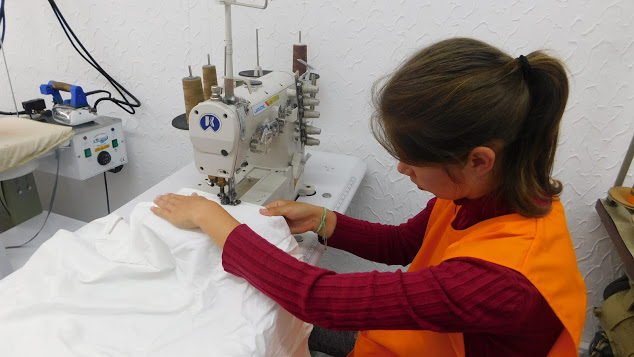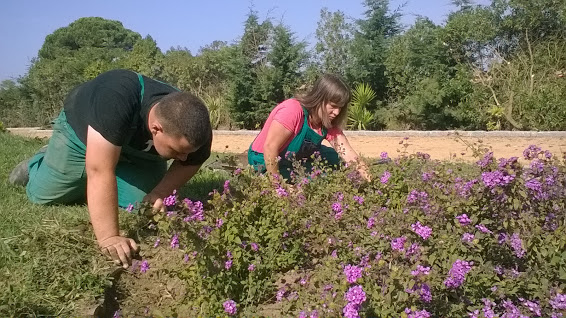
40 students of Martin János Secondary School and Vocational School of the Vocational Training Centre of Miskolc participated in mobility activities, gaining more profound theoretical and practical knowledge in 7 vocation groups and 8 vocations. The students with special educational needs gained work experience in the open labour market, in an inclusive environment. We discussed the experiences gained in the project and their impacts on the school with Coordinator Györgyné Lénárt.
From Portuguese Pastry to a Modern, System Approach School
| Institution: Martin János Secondary School and Vocational School of the Vocational Training Centre of Miskolc Project title: Green Shades in Vocational Training and the Labour Market in the South Coordinator: Györgyné Lénárt Website: http://erasmus.martinjanos.hu/ |
Where did the idea to launch an Erasmus+ project come from?
The key goals of the school include building extensive international relations, seeking constant renewal and reducing drop-out rate. Besides methodological variety, in our work we lay the emphasis on inclusive, experiential teaching and training, as well as on supporting employment. Besides academic knowledge, this more and more rapidly changing environment also requires adequate technical knowledge, so the school is committed to supporting the professional development of its teachers and students. The focus of a modern, innovative school is on the student, and the key to a good school is up-to-date and skilled teachers with European experience - and students alike. The mobility activities under the Erasmus+ programme, available for VET students and teachers, provided a great opportunity in this respect.
What happened during the placements?
During the three-week practice, our students were introduced to the technologies and production management processes of their respective specialist areas through complex tasks. Each host location turned to our SEN students with special empathy, inclusion and understanding attention, helping them master the tricks of the trade. Meanwhile, our teachers learnt about Portuguese dual vocational training. As part of their professional visits, they could study the new technologies, as well as the green and digital systems and programmes introduced in VET in Portugal. During the workshops, they also got acquainted with the methodology of reducing the rate of early school leaving and drop-out.

What practices have you integrated into your daily work?
The experiences were integrated into the school's development processes, educational programme and the local curricula. We have also integrated the knowledge gained at the school's well-equipped apprentice workshops, and it's also continuously used in practice. The newly gained knowledge and information were built into the everyday processes of teaching and learning, as well as into the topics of the project weeks, theme weeks and theme days implemented during the academic year, such as using new recipes, a digital system in the sewing workshop, or high-tech textiles in sewing. Thus, the other students of the school can also benefit from it.
The inclusive practice in the open labour market has proved to SEN students that they are capable of working in an integrated environment, gaining theoretical and practical knowledge, and that the level of their skills is appropriate for accomplishing the practical tasks assigned to them. Our students are proud of their newly gained knowledge. Their motivation and need to learn more has increased, as they could combine their theoretical and practical knowledge with actual foreign experiences. All this is verified by the students' self-assessment sheets completed during the project, which have provided measurable results in two areas. On the one hand, they practised a foreign language in a native environment, which is also confirmed by the learning outcomes of the input-output assessment; on the other hand, they improved in terms of employability criteria during the apprenticeship completed at foreign companies. After their mobilities, many of them kept in touch with their foreign workplaces, or in many cases, they even revisit them. For example, two brothers were employed by an upholstery factory in Portugal, and a pottery student demonstrated such logistics skills which he can also benefit from here, in Hungary. The Portuguese recipes of the bakery students (pastel de nata, Serradura creme cup) have appeared in the product range of the shops of Miskolc and become popular among customers.
What long-term impact has the project had?
The experiences and their impacts greatly affect the professional progress of both the students and their teachers. The methodology toolbox of professionals has expanded, with special regard to reducing early school leaving. The use of an environmentally conscious approach and green systems has been integrated into teaching-learning and practical work processes. In the field of community building, the creation of new opportunities, openness to social and cultural diversity and integration have been achieved, and students' acceptance towards each other has increased. Our school has also benefited a lot from the implementation of the project, as the number of our applicants has increased in recent years, and our students' motivation to learn has also strengthened. This latter is also very important because it contributes to reducing drop-out rates. Our colleagues also became aware that effective methods increased students' activity, as well as the effectiveness of the teaching-learning process.

What does Erasmus+ mean to you?
The project has contributed to establishing a European approach at our school, as well as to creating a better environment and atmosphere within the school through cooperation and common work among teachers, students, parents and the management. Thus, an open school community with a positive approach has developed. For me, Erasmus+ has proved that the global spread of new technologies and innovative digital systems is realised through the free flow of information, and it can be utilised in any part of the world. The integration of the outcomes into the organisational culture allows professional communication, common thinking, sharing knowledge, working together as a team and cooperation between international institutions to an even greater extent. The lack of money, time and talent is only an excuse, which should be turned into a goal so we can make our dreams come true. The experience gained in Portugal led to the development of a modern, system approach school which relies on individuals' initiatives and constant dialogue, and can, therefore, offer education that meets modern requirements - with personalised treatment, in a harmonised living space, differentiated and diverse in terms of organisation.
What are your plans for the future?
We want our school to continue to be an institution which actively and consciously shapes the professional environment and is open to changes. This requires international grant programmes and projects, as well as a continuously renewing team of professionals who are capable of maintaining the effectiveness of high-quality educational work. We organise knowledge-sharing forums and professional workshops in order to utilise the project outcomes, and as a reference institution, we lay great emphasis on presenting and transferring the best practices and innovation programmes which we have learnt about and adopted. Our plans include, among others, the implementation of new projects and the adaptation of best practices, because if you are committed, you're always on the road, and you'll always need new experiences to remain agile and creative in your work.
|
PROJECT VALUES The effects of the project are not only perceptible among those who travelled abroad and those directly involved in the project, but in the entire operation of the institution - the experiences and new knowledge gained in the project have been integrated into the everyday life of the school. The students' chances of finding employment have increased, the teachers have gained new knowledge in their respective specialist fields, and as an outcome of the project, they have integrated best practices related to reducing drop-out rates into their work. |
Utolsó módosítás: 2020.07.27.












